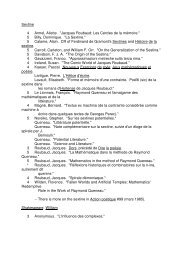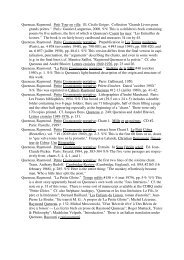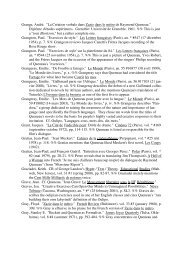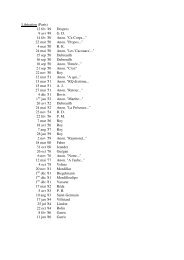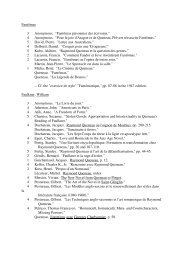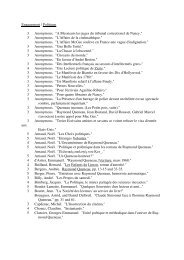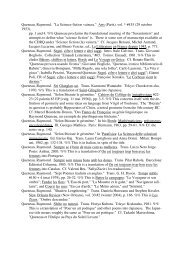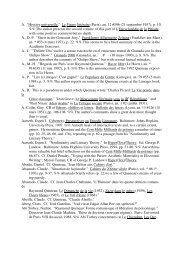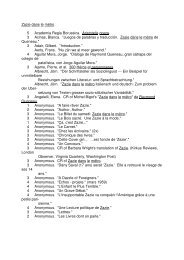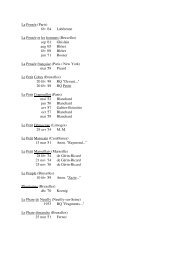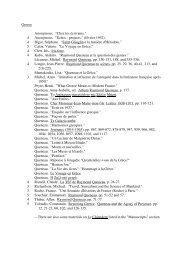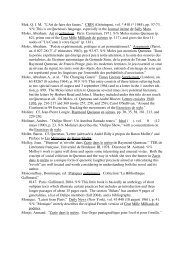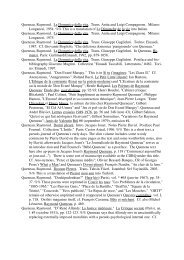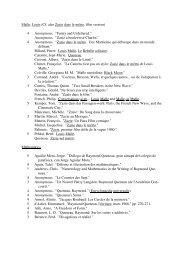Chabanne, Jean-Charles. "En lisant les lecteurs ... - Fonds Queneau
Chabanne, Jean-Charles. "En lisant les lecteurs ... - Fonds Queneau
Chabanne, Jean-Charles. "En lisant les lecteurs ... - Fonds Queneau
You also want an ePaper? Increase the reach of your titles
YUMPU automatically turns print PDFs into web optimized ePapers that Google loves.
(novembre?<br />
1946), pp. 307-310. %% Chevais just mentions <strong>Queneau</strong> in a list of secondary poets.<br />
Chevais, François. "Le Noir sied à l'humour." La Gazette des lettres (Paris), an. 5 #102 (26<br />
novembre 1949), p. 3. %% Chevais only touches on <strong>Queneau</strong> as he looks at a number of<br />
French authors and sees an American influence.<br />
Chevais, François. "Roman et cinéma." Le Courrier de l'étudiant (Paris), an. 2 #8 (avril<br />
1945),<br />
p. 4. %% Chevais's review of Loin de Rueil is quite well written and gives a rather different<br />
slant on the novel.<br />
Chevalier, Brigitte, Roland Décriaud, Marie-France Sculfort, and Alain Trouvé, ed. Lire à<br />
loisir. Textes français: 3 ième . Paris: Nathan, 19 . %% The editors include the "exercices<br />
de style" "Récit," "Notations," "Rétrograde," and "Antonymique" (p. 57) and L'Instant<br />
fatal: "Si tu t'imagines" (p. 252).<br />
Chevalier, Brigitte, Roland Décriaud, Marie-France Sculfort, and Alain Trouvé, ed. Lire à<br />
loisir. Textes français: 4 ième . Paris: Nathan, 19 . %% The editors include L'Instant fatal:<br />
"Pour un art poétique (iii)" (p. 149).<br />
Chevalier, Pierre. Cf. Catherine Humblot, "Pierre Chevalier, le téléfilm hors cadre."<br />
Chevallier, Jacques. "'Monsieur Ripois,' film de René Clément." Lumières (Paris), an. * #61<br />
(11 juin 1954), p. 5. %% Chevallier finds that while the film is technically well done<br />
there is no central subject to hold it together.<br />
Chevillard, Eric. Cf. Jordan Stump, "The Ghosts of Eric Chevillard"; Bertrand Tassou, "Les<br />
<strong>En</strong>fants de Raymond"; Alyson Waters, "Minuit Strikes Again: Eric Chevillard."<br />
Chevrier, Alain. "Menus contraints." Papil<strong>les</strong> (Roanne), vol. * #7 (octobre 1994), pp. 37-54.<br />
%% This consists of 20 oulipian menus, some in the manner of the "quennet" (the form<br />
which <strong>Queneau</strong> invented for the first section of Morale élémentaire).<br />
Chevrier, Alain. "Sur <strong>les</strong> clefs d'Odile de Raymond <strong>Queneau</strong>." In Les Romans à clefs. Ed.<br />
Michel Chaillou. Collection "<strong>En</strong> marge." Tusson (Charente): Editions du Lerot, 2000,<br />
pp. 123-126. %% Chevrier cites <strong>Queneau</strong>'s statement that Odile is not quite a "roman à<br />
clé" and then proceeds to explain who each of the characters in the novel supposedly<br />
represents. These are the Actes du troisième colloque des Invalides (3 décembre 1999).<br />
Chevrier, Alain. "La Transposition d'une forme fixe en un autre; Du sonnet au haïku." Formu<strong>les</strong><br />
(Saint-Quentin, Aisne), vol. * #2 (1998-1999), pp. 112-126. %% Chevrier traces<br />
<strong>Queneau</strong>'s development of new and/or radical poetic forms, such as the sextine, haiku, or<br />
the process described in "La Redondance chez Phane Armé." This is a quality article and<br />
of value for anyone looking deeply into <strong>Queneau</strong>'s poetizing.<br />
Cheymol, Pierre. Les Aventures de la poésie. Vol. II. Paris: José Corti, 1968. %% Cheymol<br />
describes (pp. 405-407) <strong>Queneau</strong>'s career in a most unusual and negative way, with several<br />
factual errors besides. Cf. Astrid Bouygues, "Les Mésaventures d'un critique échauffé."<br />
Cheymol, Pierre. Le Silence de Babel. Paris: José Corti, 1990. %% Cheymol attacks the<br />
"nouveau<br />
roman," including <strong>Queneau</strong> in that tendency (p. 234), mentions <strong>Queneau</strong>'s work with<br />
Boris Souvarine on the Critique sociale (p. 251), and claims (rightly so, but in an<br />
insulting manner) that 'pataphysicians, oulipians, <strong>Queneau</strong>, Lacan, and Barthes are the<br />
diametrical opposite of surrealism (p. 272).



